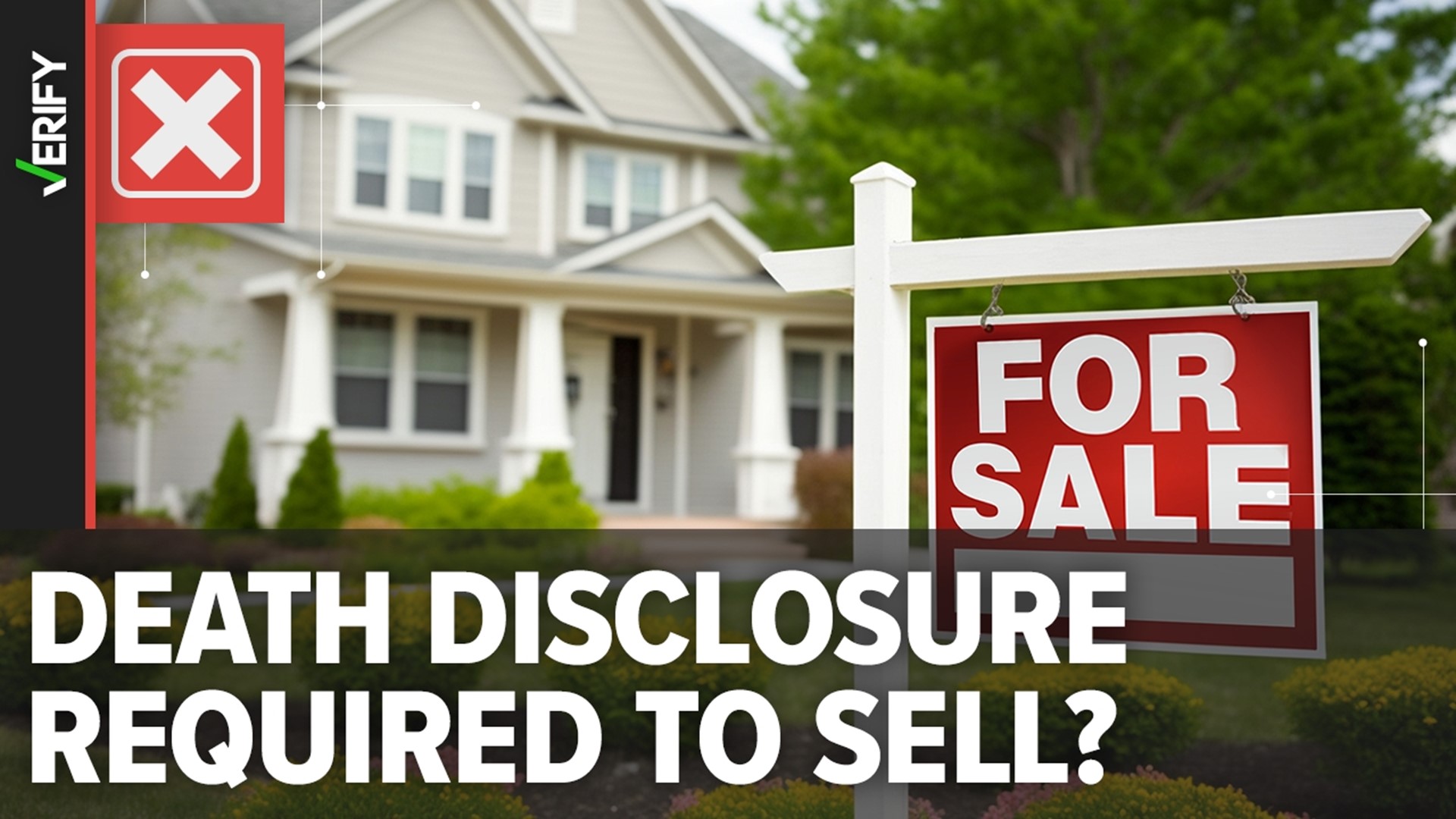Buying a new home is a daunting task, and there are lots of things to consider and questions you may have for the seller, including the history of the house.
People searching online have wondered how to find out if someone died in a home they are considering purchasing. On social media, posts have said in the U.S., home sellers may be required to tell buyers that information.
THE QUESTION
Do all states require home sellers to disclose if someone died in the house?
THE SOURCES
THE ANSWER
Sellers in most states are not required to disclose if someone died in the house. Only eight states have requirements for death disclosures.
WHAT WE FOUND
Each state has different rules when it comes to what a seller has to disclose about the home or property.
In most states, sellers are required to disclose certain “defects'' on the property, which is a condition that would significantly affect the home’s value, impair safety, or shorten the normal life of the property, according to the International Association of Certified Home Inspectors (NACHI). Some examples of physical defects to the property are known issues like a cracked foundation or a leaking roof.
But only eight states have laws that require home sellers to disclose whether someone died in the home in certain circumstances.
California has the most comprehensive death disclosure requirements of any state. Sellers in California are required to disclose any deaths – even natural causes – that happened at the home in the three years prior to the sale.
In South Dakota, it’s required to disclose if the property has been the site of homicide or suicide. In Alaska, the seller is only required to disclose if a murder or suicide happened in the home within the year prior to the sale.
Sellers in Delaware, Georgia, Kentucky, New Hampshire, and New Jersey are only required to disclose a death on the property if someone asks and they have prior knowledge of it.
No other states have requirements to disclose deaths in a home. Washington D.C. also doesn't have requirements.
In some states, like Kansas and Minnesota, licensed realtors are advised to disclose when there has been a murder that occurred in a house, but are not explicitly required to do so by law.
Here is a complete list of the laws in the remaining states and Washington, D.C.:
Alabama: Sellers do not have to disclose any deaths because Alabama is a “caveat emptor” state, which from Latin translates to “let the buyer beware.” More information on caveat emptor rules in Alabama can be found here.
Arizona: Sellers are not required to disclose if the property is a site of a natural death, suicide or homicide.
Arkansas: Sellers are not required to disclose if the property was the site of homicide or suicide.
Colorado: Sellers are not required to disclose if the property was the site of a homicide or suicide.
Connecticut: Sellers are not required to disclose if the property was the site of a death.
Florida: Sellers are not required to disclose if the property was the site of a death.
Hawaii: The law in Hawaii says sellers are not required to disclose if the property was the “site of an act or occurrence that had no effect on the physical structure or physical environment of the property.” In 2021, a local realtor published a blog post telling home sellers that because the law could be subject to interpretation on what could be considered an act or occurrence that could harm the property, it’s best to disclose any death on the property.
Idaho: Sellers are not required to disclose if the property at any time was suspected of being the site of a suicide or homicide.
Illinois: Sellers are not required to disclose anything unless it affects the physical condition of the property.
Indiana: Sellers are not required to disclose if the property is the site of a death.
Iowa: Iowa has no specific requirement on death disclosures.
Louisiana: Sellers are not required to disclose if the property was the site of a homicide or suicide.
Maine: Maine has no specific requirement on death disclosures.
Maryland: Sellers are not required to disclose if the property was the site of a homicide, suicide, accidental death or natural death.
Massachusetts: Sellers are not required to disclose if the property was the site of a suicide, homicide, or the site of an alleged parapsychological or supernatural phenomenon.
Michigan: Sellers are not required to disclose if the property was the site of a homicide, suicide or any other act or occurrence that had no effect on the condition of the property.
Mississippi: Sellers are not required to disclose if the property was the site of a natural death, suicide, homicide or any other act or occurrence that had no effect on the condition of the property.
Missouri: Sellers are not required to disclose if the property was the site of a homicide or suicide.
Montana: Montana has no specific requirement on death disclosures. The Montana Association of Realtors says death is not required to be disclosed but it’s encouraged.
Nebraska: Nebraska has no specific requirement on death disclosures.
Nevada: Sellers are not required to disclose if the property was the site of a homicide, suicide, or death by any other cause, except a death that results from the condition of the property.
New Mexico: Sellers are not required to disclose if the property was the site of a natural death, homicide or suicide.
New York: Sellers are not required to disclose if the property was the site of a homicide, suicide or other death by accidental or natural causes.
North Carolina: Sellers are not required to disclose if the property was the site of any death.
North Dakota: Like Alabama, North Dakota is a caveat emptor state. That means disclosure is not required.
Ohio: Ohio has no specific requirement on death disclosures.
Oklahoma: Sellers are not required to disclose if the property was the site of a suicide or homicide.
Oregon: Sellers are not required to disclose if the property was the site of a death by violent crime, by suicide, or by any other manner.
Pennsylvania: Sellers are not required to disclose if the property was the site of a murder or suicide.
Rhode Island: Sellers are not required to disclose if the property was the site of a homicide or suicide.
South Carolina: Sellers are not required to disclose if the property was the site of any death.
Tennessee: Tennessee has no specific requirement on death disclosures.
Texas: Sellers are not required to disclose if the property was the site of a death by natural causes, suicide or by an accident unrelated to the condition of the property that occurred on the property.
Utah: Sellers are not required to disclose that the property for sale is “stigmatized.” The National Association of Realtors says a stigmatized property has been the site of events like murder, suicide, alleged hauntings or have notorious previous owners.
Vermont: Vermont has no specific requirement on death disclosures.
Virginia: Virginia is a caveat emptor state. That means disclosure is not required.
Washington: Sellers are not required to disclose if the property, or neighboring properties, has been the site of a murder, suicide or other death.
West Virginia: West Virginia has no specific requirement on death disclosures.
Wisconsin: Wisconsin has no specific requirement on death disclosures.
Wyoming: Wyoming has no specific requirement on death disclosures.
Washington D.C.: Sellers are not required to disclose if the property has been the site of a suicide or homicide.












